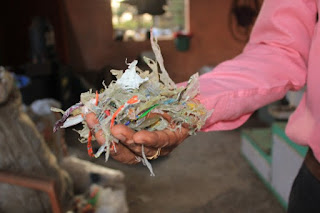It's not every day that you hear of a municipal waste dumping ground that is a tourist attraction. But in Vengurla taluka, a half-hour drive from India's tourist hub of Goa, it isn't just the pristine beaches that are drawing people.
In 2017 so far, the municipal waste dumping ground, where every piece of waste is recycled, has received 7,000 visitors. They're travelling to see how the small municipality is recycling 7 tonnes of waste generated each day and transforming their community. It is earning a hefty income, which is being ploughed back into municipal activities.
In 2015, under the watchful eye of Ramdas Kokare, the chief officer of Vengurla municipality, the hamlet began a process of transforming how it dealt with its waste. The municipal council began segregating waste at source. Plastic bags were banned, and door-to-door campaigns urged households to begin separating their waste, teaching them how. Today, two years later, all 3,000 households separate waste in up to four different coloured bins. Municipal collectors pick up waste six days a week and transport it to the municipal dumping ground.
At the waste collection centre, you're greeted by lush green gardens (using organic fertilizer generated at the ground itself), behind which are smaller areas where different types of waste are neatly stored. Here, 20 municipal workers painstakingly segregate waste into 23 different categories. Wet waste is used to generate biogas, producing 30 units of electricity per tonne, which powers all the different types of machines used here.
Virtually every other type of waste is also recycled. A briquette machine helps process dry waste such as cloth, paper, cardboard into briquettes, which are sold to nearby industries as alternate fuels for boilers. Heavy plastic is sold to cement factories where it is melted at 3000 degrees Celsius. The municipal council found considerable support in the private sector with banks and insurance companies in the area chipping in to replace plastic with cloth carry bags, and providing waste collecting vehicles.
"Waste is not a problem," says Kokare. "It's mixed waste that is the challenge," he adds. Vengurla has demonstrated that managing waste can be good business. Each month, the municipality earns INR 150,000 (US$ 2,300), which is used to improve solid waste management systems in the village. Kokare says, "If we don't effectively manage waste generated in our area, it will follow us everywhere – in the soil, in the air, and in the seas that sustain us."
As the country steps up efforts to Clean India, initiatives such as those in Vengurla are demonstrating that a combination of awareness, innovation and partnerships can go a long way in transforming waste to wealth.

